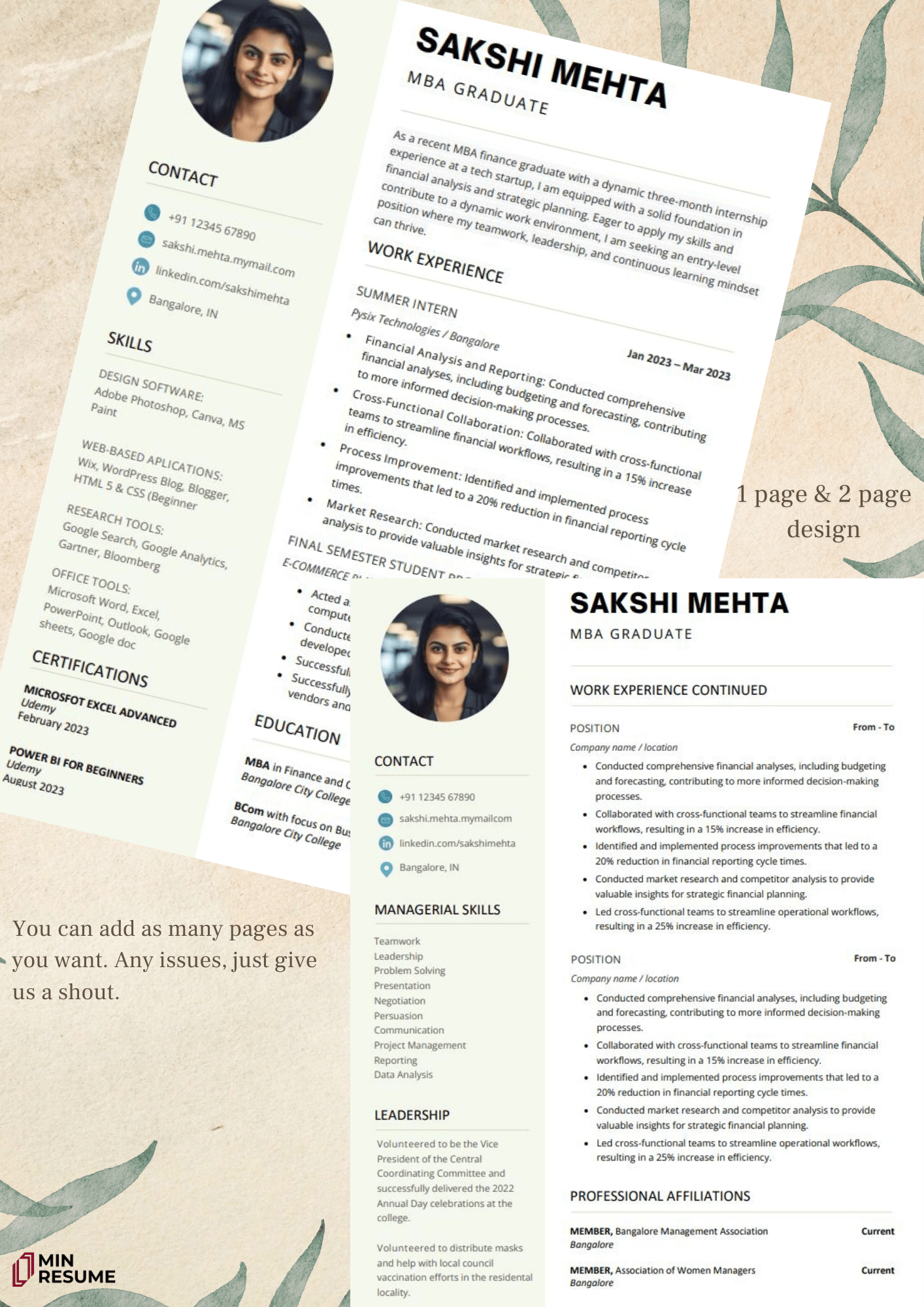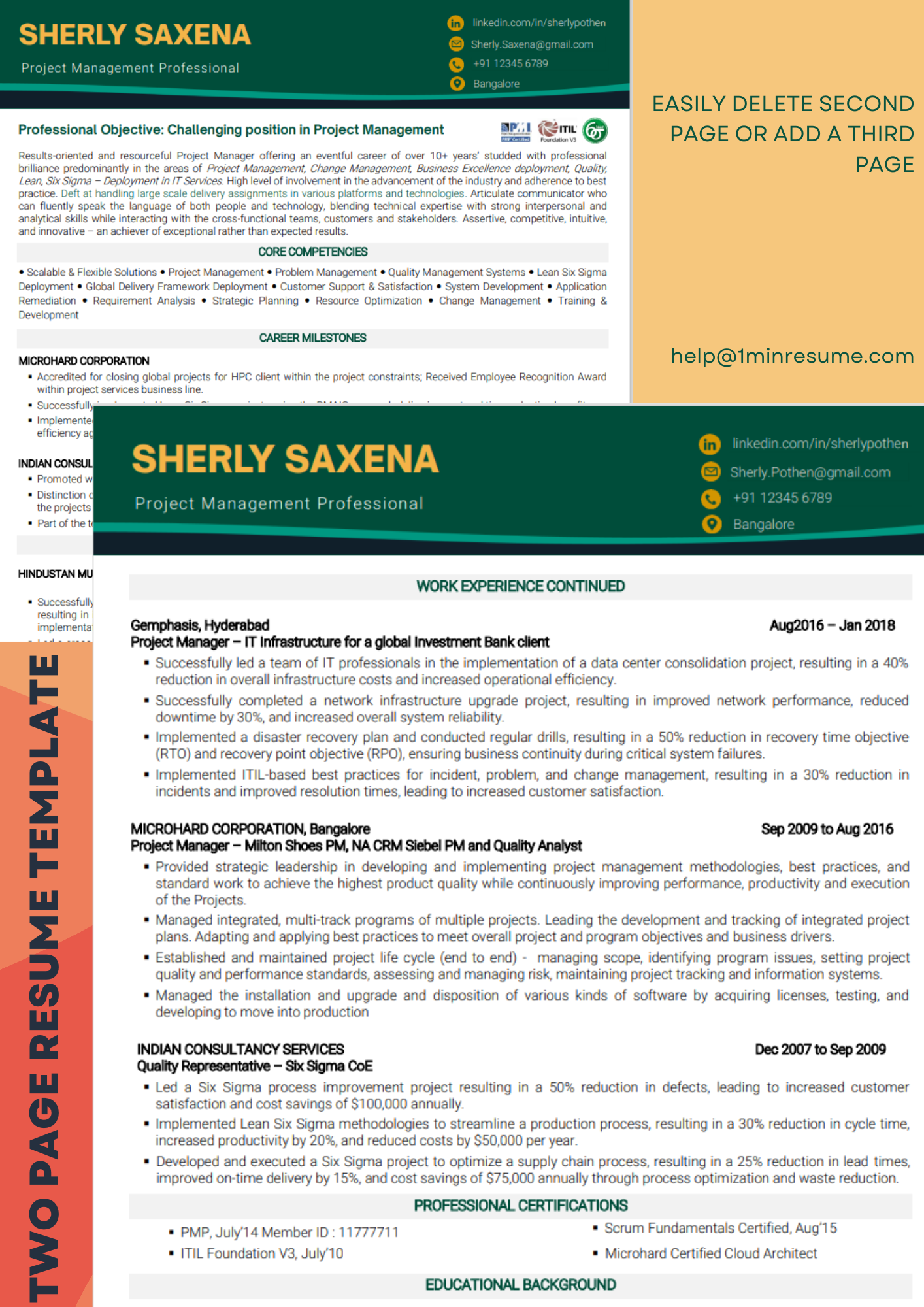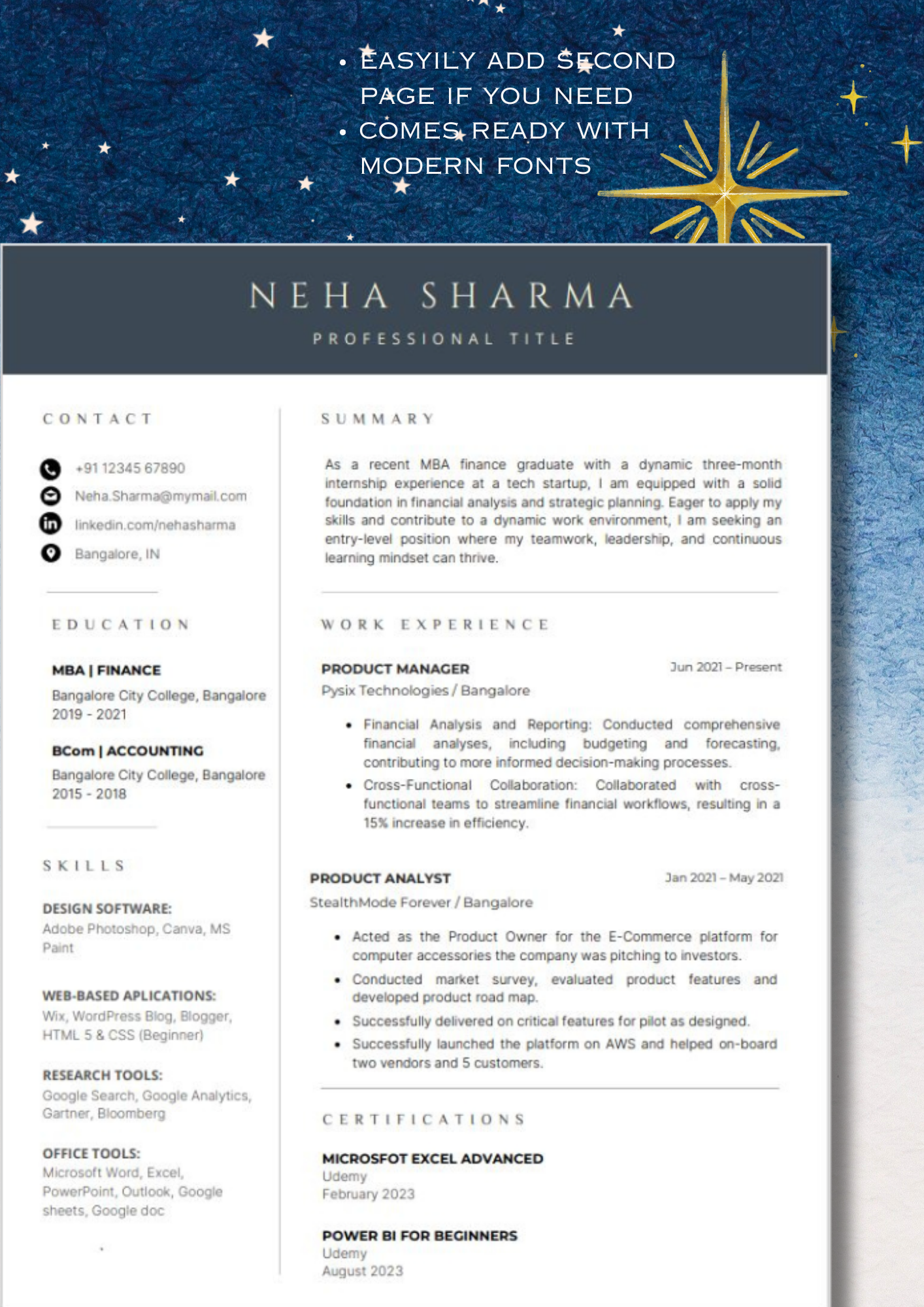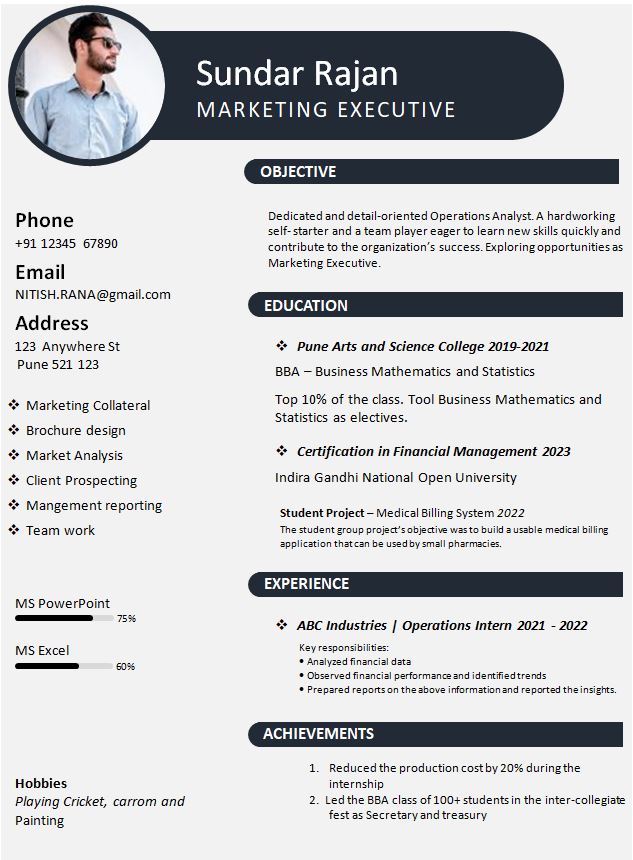Modern Resume
Modern Simple Two Page Template Resume
Fresher and Experienced Template
Modern2p


Objective
As a recent MBA finance graduate with a dynamic three-month internship experience at a tech startup, I am equipped with a solid foundation in financial analysis and strategic planning. Eager to apply my skills and contribute to a dynamic work environment, I am seeking an entry-level position where my teamwork, leadership, and continuous learning mindset can thrive.
Education
All bachelors and masters degree holders
Skills
MANAGERIAL SKILLS
Teamwork
Leadership
Problem Solving
Presentation
Negotiation
Persuasion
Communication
Project Management
Reporting
Data Analysis
TECHNICAL SKILLS
DESIGN SOFTWARE:
Adobe Photoshop, Canva, MS Paint
WEB-BASED APLICATIONS:
Wix, WordPress Blog, Blogger, HTML 5 & CSS (Beginner)
RESEARCH TOOLS:
Google Search, Google Analytics, Gartner, Bloomberg
OFFICE TOOLS:
Microsoft Word, Excel, PowerPoint, Outlook, Google sheets, Google doc
Interests/Hobbies
If you are confused about what hobbies to include on your resume, it is perfectly normal to feel so especially given there are so many hobbies and interests we think we have but not sure if any of them should be on our resumes.
A one line advice from us is if you are not sure there is real value in adding any of your hobbies and interests on the resume, don't include any. But if you are strategic about adding hobbies and interests to your resume, there are certain benefits to it.
If you are confused about which hobbies to include, read on.
For example, you think you possess traits such as hardworking, diligent and eater to learn. Then highlighting your personality traits such as being hardworking, diligent, and eager to learn through hobbies and interests can provide a well-rounded view of your character. Here's how you can communicate these traits effectively on your resume:
Select Relevant Hobbies:
Choose hobbies that align with the qualities you want to showcase. For example, if you enjoy taking on challenging projects in your free time or participating in activities that require diligence, include them on your resume.
Highlight Learning Opportunities:
Mention hobbies that involve continuous learning or skill development. This could include activities like online courses, attending workshops, or joining clubs or groups related to your interests.
Use Action Verbs:
When describing your hobbies, use action verbs that convey your work ethic and enthusiasm. For instance, "tackling complex puzzles," "engaging in rigorous physical training," or "volunteering for challenging projects" can all imply diligence and hard work.
Emphasize Achievements:
If your hobbies involve achievements or milestones, include them on your resume. This could be completing a marathon, mastering a musical instrument, or successfully organizing events. These accomplishments showcase your commitment and ability to see tasks through to completion.
Connect Hobbies to Transferable Skills:
Identify transferable skills gained from your hobbies that are relevant to the workplace. For instance, if you enjoy playing a musical instrument, it may demonstrate discipline, patience, and the ability to master complex tasks.
Show Teamwork and Collaboration:
If your hobbies involve teamwork or collaboration, highlight them. This can demonstrate your ability to work well with others and contribute to a collective goal.
Example of how to incorporate these traits into your resume:
Hobbies and Interests:
Problem-Solving Puzzles:
Engage in solving complex puzzles and brain teasers, showcasing a strong analytical mindset and problem-solving skills. This hobby reflects my commitment to overcoming challenges through diligence and perseverance.
Continuous Learning Enthusiast:
Actively pursue online courses and attend workshops to broaden knowledge and stay updated on industry trends. Eager to acquire new skills and insights, demonstrating a commitment to ongoing personal and professional development.
Community Volunteer Leader:
Volunteer for community projects, taking on leadership roles and collaborating with diverse teams to achieve shared objectives. This experience showcases my dedication to making a positive impact and working harmoniously with others.
By framing your hobbies in this way, you can effectively communicate your hardworking, diligent, and eager-to-learn qualities to potential employers. This provides a more personal and nuanced perspective on your character beyond your professional experience.
Additional Inputs
CERTIFICATIONS
MICROSFOT EXCEL ADVANCED
Udemy
February 2023
POWER BI FOR BEGINNERS
Udemy
August 2023
Benefits of adding certifications to your resume
Including certifications on your resume can provide several benefits, despite the fact that recruiters may not be able to validate them immediately. Here are some reasons why including certifications is advantageous:
Demonstrates Skill Proficiency:
Certifications serve as tangible evidence of your proficiency in specific skills or technologies. They can act as a quick and recognizable way for recruiters to gauge your qualifications.
Highlights Continuous Learning:
Including certifications showcases your commitment to ongoing professional development and a willingness to stay current in your field. This reflects positively on your adaptability and eagerness to learn.
Increases Credibility:
While recruiters may not validate certifications immediately, listing reputable and recognized certifications adds credibility to your resume. Well-known certifications from respected organizations carry weight and can enhance your overall credibility as a candidate.
Differentiates You from Competitors:
Certifications can help you stand out from other candidates with similar educational backgrounds or work experience. They provide an additional layer of specialization that sets you apart in a competitive job market.
Aligns with Job Requirements:
Many job postings include specific certifications as preferred or required qualifications. Including relevant certifications on your resume increases your chances of meeting the specific criteria outlined in job descriptions.
To ensure that you stand out as a genuinely qualified candidate:
Be Selective:
Include certifications that are directly relevant to the job you're applying for. Focus on those that align with the skills and qualifications sought by the employer.
Provide Details:
Instead of just listing the certification, provide additional details such as the certifying authority, date of certification, and any notable achievements or projects associated with the certification.
Include Validation Information:
If possible, include a section on your resume where you mention that certification details can be provided upon request. This allows you to share additional information during the interview or application process.
Showcase Practical Application:
Where applicable, describe how you have applied the knowledge gained from certifications in your previous roles or projects. This demonstrates not only theoretical understanding but also practical application.
Network and Seek Recommendations:
Build a professional network and seek recommendations from colleagues or mentors who can vouch for your skills and the legitimacy of your certifications. Having credible references can enhance your overall candidacy.
While including certifications on your resume is valuable, it's essential to pair them with strong education, relevant work experience, and effective communication of your skills and achievements. This holistic approach will contribute to a comprehensive and compelling representation of your qualifications as a candidate.


